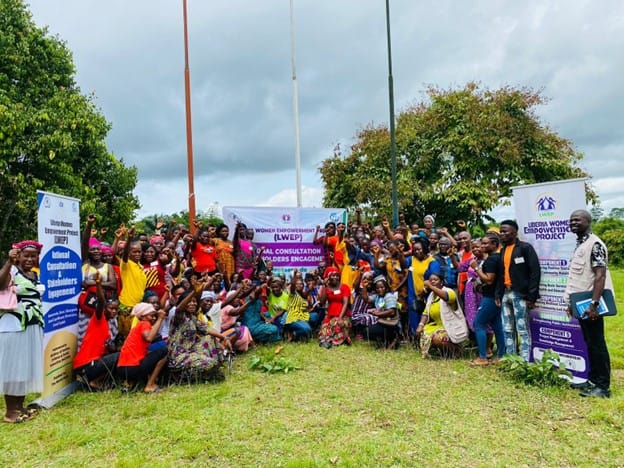Liberia Women Empowerment Project Concludes Three-Day National Consultation and Stakeholders Engagement in Rural Montserrado - FrontPageAfrica

Source: Front Page Africa
Author: Francis Landford
Monrovia - As part of the processes leading to the implementation of the World Bank-sponsored US$44.6 million project, the Liberia Women Empowerment Project (LWEP) has concluded a three-day National Consultation and Stakeholders Engagement in Rural Montserrado.
On June 6, 2024, the LWEP, the implementing arm of the Ministry of Gender, Children and Social Protection, representing the Liberian government, began an intensive National Consultation and Stakeholders Engagement in Bentol City, Rural Montserrado County.
The engagement continued on June 7, 2024, in Todee District and concluded on Saturday, June 8, 2024, in the City Corporation of Arthington, gathering a large number of citizens, predominantly women from the five clans of the corporation and surrounding areas.
Rural Montserrado is one of six counties in Liberia where the LWEP will be implemented to empower women and girls.
The consultative sessions with communities focused on fostering a deep understanding of how local communities can effectively raise concerns, provide feedback, and lodge complaints regarding project implementation in their localities.
The engagement served to disseminate vital information about the LWEP to the targeted beneficiaries and counties, ensuring a collaborative and transparent approach to project implementation.
Hundreds of stakeholders, including women within Village Savings and Loans (VSLAs) groups, farmers, fishmongers, cooperatives, religious, and traditional leaders, lauded the government of Liberia for the project that will benefit marginalized groups, particularly women. However, they expressed discontent over their exclusion from similar initiatives in the past.
Outlining some of their major challenges, Tenneh Wilson, a spokesperson in Bentol City, said, "We have not been benefiting from some of these grants over the years. The big people in power have been prioritizing their personal interests while the local persons are the victims."
Additionally, Klubodo Gbo, the Traditional Head in Bentol, asserted in her Kpelle vernacular that rural women often exert efforts to brush the farm, but when the items needed come for their direct benefit, they are left in limbo. She added that rural women have suffered all forms of domestic violence but is convinced that the LWEP will serve them adequately.
In Todee and Arthington, stakeholders named division among citizens, lack of trust, sustainability plans, and transparency for VSLAs as key challenges they face among themselves and their authorities.
Following lengthy discussions, the stakeholders urged the Project Management Unit (PMU) of the LWEP to thoroughly scrutinize the recruitment process of beneficiaries for proper implementation. They emphasized the need for a merit-based selection process to ensure the smooth implementation of the program.
Elton O. Kollie of Todee District in Montserrado County Electoral District #1 stressed, "Nothing is straight without law and order. Therefore, there should be rules and regulations put in place and must be honored by the beneficiaries, a robust monitoring, and check and balance before and at the start of the project."
They further recommended that the LWEP conduct frequent visits to program sites to ensure beneficiaries use the grant for its intended purposes and encourage project participants that despite their challenges, they can make a positive impact on society.
Local officials in Bentol, Todee, and Arthington also called for training sessions for the secretary and officials of the Village Savings and Loan Associations to ensure accountability and transparency, highlighting these as major challenges impeding the progress of many VSLAs.
Stakeholders also called for the establishment of a specific body by the LWEP to receive complaints regarding beneficiaries whose actions may undermine the project's smooth implementation. They recommended that this body fast-track impartial investigations, come up with findings, and take necessary decisions to serve as deterrents.
Meanwhile, the National Coordinator for the LWEP, Cllr. Margaret Nigba, acknowledged the many challenges flagged by the stakeholders during the three-day engagements and thanked them for the highly spirited reception and willingness to successfully implement the project.
She informed the citizens that to address those challenges faced by women and girls, the Liberian government signed a five-year US$44.6 million loan agreement with the World Bank to empower women and girls, making them economically stable.
"The government's quest to tackle gender-based violence against women and girls cannot be overemphasized. We have to create the necessary awareness, bringing all actors and stakeholders on board. But trust me, this goal of the government supported by the World Bank cannot be achieved without an empowerment and sustainability plan, and that's why this project has come to address," Cllr. Nigba stressed.
While pledging the continued commitment of the Minister of Gender, Children and Social Protection, Gbeme Teta Horace-Kollie, to fully promote President Joseph Nyuma Boakai's vision aimed at improving the livelihood of ordinary citizens, Cllr. Nigba urged the beneficiaries to take complete ownership of the project and sustain it.
The Individual Enterprises (IEs) focus on a single individual doing his/her own business, with grants ranging from US$1,000 to US$2,500 based on the business plan.



